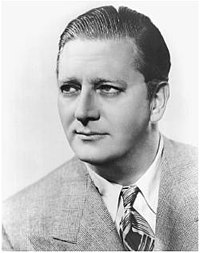Hunt Stromberg
| Hunt Stromberg | |
|---|---|
 |
|
| Born |
July 12, 1894 Louisville, Kentucky, United States |
| Died | August 23, 1968 (aged 74) Santa Monica, California, United States |
| Resting place | Calvary Cemetery, Los Angeles |
| Occupation | Film producer, director, writer, publicist |
| Years active | 1921–1951 |
| Spouse(s) | Katherine Kerwin, ? – 1951 (her death) |
| Children | Hunt Stromberg Jr. |
| Awards | Academy awards: The Great Ziegfeld, Best Picture, 1936 |
Hunt Stromberg (July 12, 1894 – August 23, 1968) was a film producer during Hollywood's Golden Age. In a prolific 30-year career beginning in 1921, Stromberg produced, wrote, and directed some of Hollywood's most profitable and enduring films, including The Thin Man series, the Nelson Eddy/Jeanette MacDonald operettas, The Women, and The Great Ziegfeld, which won the Academy Award for Best Picture of 1936.
Hunt Stromberg was born in Louisville, Kentucky in 1894. Leaving a career as a newspaper reporter and sports writer for the St. Louis Times, he followed an advertising friend into the motion picture industry prior to World War I, becoming publicity director for the Goldwyn Pictures Corporation in New York.
In 1918, the company sent Stromberg to California, where he developed an interest in filmmaking; by 1919 he had become the personal representative of industry pioneer Thomas H. Ince, and by 1921 he had written, produced and directed his first film. He promptly resigned from Ince's staff to form Hunt Stromberg Productions.
From his first independent film, The Foolish Age (1921), Stromberg quickly made his mark by turning out independent, low-budget films in increasing quantity and quality.
In 1922 Stromberg signed Bull Montana, a popular matinee idol, to a long-term contract to star in short comedies, and hired comedy director Mal St. Clair, who had worked with Mack Sennett and Buster Keaton. When Sid Grauman saw a rough cut of the resulting A Ladies' Man (1922), he immediately booked the film to premiere at his Million Dollar Theater in Los Angeles on April 30, 1922. Stromberg continued his string of successes with Breaking into Society (1923), which he wrote, produced and directed.
Stromberg joined newly formed Metro-Goldwyn-Mayer in 1925 and became one of its key executives, listed as one of the studio's "Big Four" with Louis B. Mayer, Irving Thalberg, and Harry Rapf—later with Thalberg, David O. Selznick, and Walter Wanger.
...
Wikipedia
